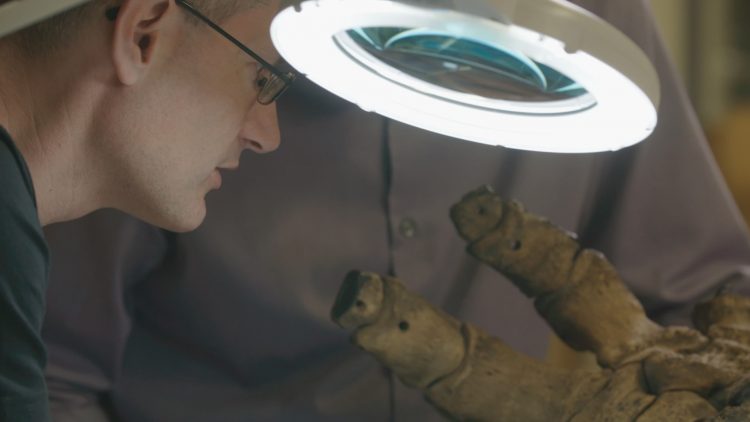New insights into the life and mysterious death of Jumbo the elephant – a celebrity animal superstar whose story is said to have inspired the film ‘Dumbo’ – will be revealed in an international documentary featuring a University of Leicester archaeologist on Sunday 7 January.
The documentary, titled ‘Jumbo: The Life of an Elephant Superstar’, will be broadcast on the Canadian Broadcasting Corporation’s ‘The Nature of Things’ and features Dr Richard Thomas, from the University of Leicester’s School of Archaeology and Ancient History, who was lead scientist on the project.

The new documentary builds upon the recent documentary ‘Attenborough and the Giant Elephant’, which was broadcast early last year and saw Dr Thomas team up with Sir David Attenborough to explore Jumbo’s story and how our attitude towards captive elephants has changed dramatically in recent years.
As part of the project Dr Thomas spent a week in New York analysing Jumbo’s skeleton, which offered vital clues into Jumbo’s life and controversial death.
Dr Thomas worked with Professor John Hutchinson (Royal Veterinary College) and Dr Holly Miller (University of Nottingham) to build a biography of Jumbo’s life – with the hope of resolving the long-standing mystery of how he died.
As part of the analysis the team were given unique access to Jumbo’s skeleton at the American Museum of Natural History.
‘Jumbo: The Life of an Elephant Superstar’ is presented by science broadcaster David Suzuki and examines Jumbo’s forgotten skeleton, building a picture of the course of his life and revealing how a lack of knowledge about elephants at the time affected Jumbo.
Travelling to Africa, the team examined the latest science that reveals that elephants can suffer from a form of Post-Traumatic Stress Disorder.
They also uncovered the importance of the relationship between mothers and their babies and highlight the extraordinary work of The David Sheldrick Wildlife Trust in Kenya who rescue orphaned elephants and return them to the wild.
The documentary will also explore key questions surrounding Jumbo’s life, including if he truly was the biggest elephant in the world.
Dr Richard Thomas, from the University of Leicester’s School of Archaeology and Ancient History, said: “Jumbo is perhaps the most famous elephant in the world. His name is now used as an adjective to describe everything from passenger planes to toilet roll. His story is both captivating and tragic. Born in Sudan in 1860 he was captured as a calf and transported to a zoo in Paris, before arriving at London Zoo in 1865 as their first African elephant. Whilst at London he became the pride of the Zoo, often giving walks to children around the city.
“Jumbo had an intimate relationship with his keeper Matthew Scott – under whose care he survived illness and grew to be the ‘largest elephant in the world’, or so it was claimed.
“Unfortunately, Jumbo became increasingly aggressive as he reached sexual maturity and the zoo took the controversial decision of selling him to Barnum and Bailey’s travelling circus. Despite major public protests, a petition, and an outbreak of Jumbo-mania, Jumbo was eventually shipped across the Atlantic, arriving in New York to great fanfare in 1882.
“In America he became centrepiece of the Greatest Show on Earth, a travelling circus that traversed the length of the US and Canada. Unfortunately, Jumbo died in tragic circumstances: contemporary accounts describe that he was hit by a train while crossing the track to reach his carriage, possibly saving a younger elephant in the process; however, a number of stories emerged at the time suggesting that his death may not have been an accident.”
‘Jumbo: The Life of an Elephant Superstar’ will be broadcast on Sunday 7 January, 2018 at 8:00PM on CBC-TV’s ‘The Nature of Things’.






